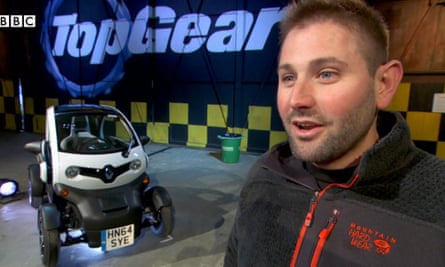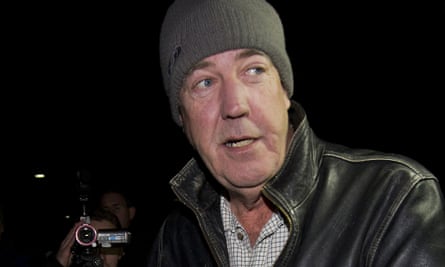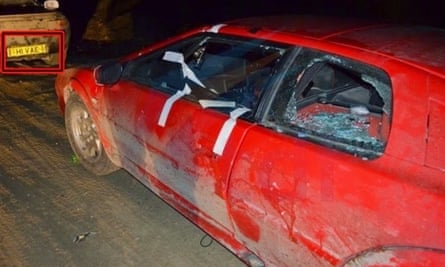Jeremy Clarkson could face a police investigation into the unprovoked attack that left a colleague bleeding and cost the Top Gear presenter his job, bringing an end to a BBC career that spanned four decades.
The BBC director general, Tony Hall, said “with great regret” he decided not to renew Clarkson’s contract, saying the presenter had “crossed a line” which left him with no alternative.
North Yorkshire police have requested a copy of the BBC report that found Clarkson had been responsible for an “unprovoked physical and verbal attack” on Top Gear producer Oisin Tymon, who sought hospital treatment after the attack.
An internal inquiry overseen by BBC Scotland boss Ken MacQuarrie concluded that Tymon was struck by Clarkson during an unprovoked 30-second physical attack “resulting in swelling and bleeding to his lip”.

Tymon, who was subjected to a sustained verbal abuse by the presenter, was left “shocked and distressed by the incident” and “drove to a nearby A&E department for examination”.
Hall said Clarkson had crossed a line by subjecting an “innocent party [to] a physical altercation accompanied by sustained and prolonged verbal abuse of an extreme nature”.
The North Yorkshire force said it was “liaising with the BBC regarding the alleged incident in North Yorkshire involving Jeremy Clarkson.
“We have asked the BBC for the report which details the findings of their internal investigation into the matter. The information will be assessed appropriately and action will be taken by North Yorkshire police where necessary.
“It would not be appropriate for North Yorkshire police to comment further at this time.”

Confirming Clarkson’s departure on Wednesday after mounting speculation about his future, Hall said the BBC was a broad church which required distinctive and different voices but said they “cannot come at any price. Common to all at the BBC have to be standards of decency and respect.
“I cannot condone what has happened on this occasion. There cannot be one rule for one and one rule for another dictated by either rank, or public relations and commercial considerations.”
The report, published on Wednesday, revealed the full extent of the attack at the Simonstone Hall hotel in North Yorkshire, where the programme team had travelled for a location shoot on 4 March.
Clarkson was said to have been unhappy after being offered a cold platter of food after filming rather than steak and chips, but other reports suggested it was a consequence of problems during the day’s shoot.
The BBC report said Clarkson verbally abused Tymon “on more than one occasion – both during the attack and subsequently inside the hotel – and contained the strongest expletives and threats to sack him.
“The abuse was at such volume as to be heard in the dining room, and the shouting was audible in a hotel bedroom.”
The report said the physical attack lasted 30 seconds and was halted by a witness, with Tymon offering no retaliation.
Clarkson reported the incident himself to the BBC on 9 March and was suspended the following day.
Tymon, who was subject to vitriolic attacks on Twitter by people who blamed him for Clarkson’s departure, said he was “grateful to the BBC for their thorough and swift investigation into this very regrettable incident”. The producer’s lawyer said he now wished to return to “the job he loves at the BBC”.
Hall said the BBC wouldtry to carry on with Top Gear, one of BBC2’s most popular shows with more than 5 million viewers a week and a global hit that generates around £50m a year for its commercial arm, BBC Worldwide.
But it remains to be seen whether Clarkson’s co-presenters, Richard Hammond and James May, will remain on the show. All three presenters’ contracts were due to run out at the end of this month.
May described Clarkson’s departure as a tragedy. Asked about his future, May said: “We are very much the three of us a package. It works for complicated reasons that a lot of people don’t fully understand. So that will require a lot of careful thought.”
Hammond said on Twitter: “Gutted at such a sad end to an era. We’re all three of us idiots in our different ways but it’s been an incredible ride together.”
Gutted at such a sad end to an era. We're all three of us idiots in our different ways but it's been an incredible ride together.
— Richard Hammond (@RichardHammond) March 25, 2015
Hall admitted it would be a big challenge to continue the show in Clarkson’s absence “and there is no point in pretending otherwise”.
Clarkson’s departure will also be viewed with crushing disappointment by many of the show’s fans who regard the presenter’s unapologetically outspoken personality - he once told BBC1’s The One Show that striking public sector workers should be shot - as a welcome antidote to the era of political correctness. An online petition in support of Clarkson attracted more than 1m signatures.
Alan Yentob, the BBC’s creative director, said he hoped May and Hammond would remain. He told Radio 4’s Media Show the attack on Tymon was of a different nature to the other controversies surrounding the Top Gear presenter.
Clarkson was given a final warning by the BBC last year after he appeared to mumble the N-word in a Top Gear out-take. The BBC’s director of television, Danny Cohen, had wanted to take disciplinary action against the presenter but was overruled by Hall.
The latest in a long line of controversies, Clarkson and the Top Gear crew were forced to flee Argentina last year after they were pelted with stones by a crowd incensed that one of their vehicles had a number plate that appeared to refer to the Falklands conflict.

Clarkson was accused of “casual racism” during a Top Gear special in which the team built a bridge over a Burmese river. As a man walked across the bridge Clarkson made a comment that there was a “slope on it”.
The programme previously prompted complaints from the Indian High Commission and was forced to apologise to the Mexican ambassador to the UK who complained after Hammond described Mexicans as “lazy, feckless and flatulent”.
Clarkson had not commented on Wednesday, beyond changing his Twitter status to “I used to be a presenter on the BBC2 motoring show, Top Gear”.
There would be no shortage of broadcasters keen to hire Clarkson, with ITV seen as the most likely destination in the UK, although the presenter has also been tipped for a mould-breaking move to US video-on-demand service Netflix. Sources at Sky have played down any suggestion it would also be enthusiastic to hire the presenter.
Reports that the BBC has lined up Chris Evans to take over from Clarkson are believed to be incorrect. The Radio 2 breakfast DJ, who has a huge car collection, told listeners on Wednesday: “This is not true. Not only is it not true – it’s absolute nonsense.”
Clarkson is still due to guest host an episode of BBC1’s satirical panel show, Have I Got News for You, next month.
Clarkson’s dismissal brought reaction from across the world, including unlikely responses from Star Trek’s William Shatner (“What Clarkson did was wrong and I’m sure he regrets it”) and singer Donny Osmond who said on Facebook he was “pretty sad” but Clarkson’s conduct “cannot be condoned”.
A spokesman for David Cameron, a personal friend of Clarkson who had previously backed the presenter as a “huge talent”, said the prime minister believed “if you do something wrong at work there can be consequences” and that “aggressive and abusive behaviour is not acceptable in the workplace”.